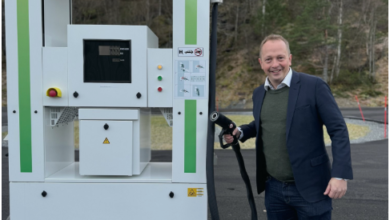Logan Energy unveils new mobile hydrogen unit
Logan Energy says the product has been developed in response to demand from the hydrogen sector, particularly transport.

Hydrogen technologies leader Logan Energy has unveiled a mobile compression trailer, which aims to accelerate the uptake of hydrogen as a low-carbon vehicle fuel in the UK.
The trailer unit, the size of a horsebox, can be easily attached to a vehicle and taken to wherever hydrogen needs to be moved from one cylinder to another. Its automated compressor ensures a vehicle, or cylinder, can be filled in one go with no attendance required.
Bus companies increasingly use hydrogen to achieve net-zero emissions after establishing that battery electric vehicles cannot meet all routes’ requirements.
Logan Energy is already providing trailers to end-users and is in serial production to deploy many more trailers to leading bus companies, HGV users, and other commercial applications.
The compression unit has been designed with safety and security in mind. The aim was to build something that overcame the barriers that many companies have to accessing hydrogen equipment where and when they need it. It is a great example of forward-thinking at Logan Energy and shows how we are helping businesses and society toward a net-zero future.
A supply of hydrogen is connected to the unit’s inlet, which can be an electrolyser, compressed hydrogen in cylinders or trailers, or other sources. To fill a vehicle, the user connects the vehicle, presses a fill button and then waits for it to be filled. A similar process is followed to fill other systems, but different connections are used. The unit has been designed to automatically fill three different pressure systems and base around filling cylinders or MCPs to 200 barg using a Type 4 connection, vehicles to 350 barg using a standard nozzle, or 450 barg cylinders.
Logan Energy CEO Bill Ireland said, “This new mobile unit is the latest innovation from Logan Energy and is in response to the market. It is a much-needed solution for companies adopting hydrogen as a low-carbon fuel for their bus or lorry fleets.”
